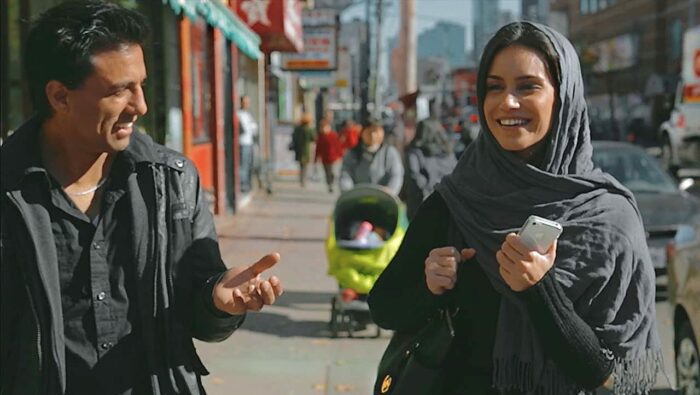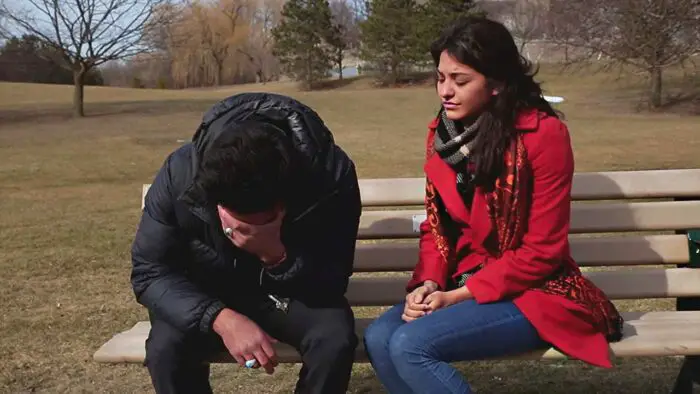Mani Nasry has worn many hats during his time working in the movie industry. At just 19-years-old, Nasry ventured to New York to study acting at the same legendary institutions which trained Al Pacino, Robert De Niro, and countless others. From acting, Nasry learned that telling compelling stories which reflect our lives and of society was a more fulfilling path to travel in life, rather than be in the industry for riches and glamour. For his most recent project, We, a film Nasry produced, directed, and stars in from a script by Alejandro Leopardi, he tells the story of Ethan (Nasry) and Gabriela (Humberly González), two people deeply attracted to each other, yet their relationship faces many obstacles because they both come from different cultures. The themes explored in the award-winning We could not be more timely and that along with featuring a diverse and talented cast of Canadian performers make it one to seek out.
Jason: I’m very interested in your background, being born in a foreign country and your journey from there, and how the desire to tell stories through film came about. Can you tell readers about that?
Mani Nasry: I was born in Afghanistan but was always thankful and grateful to move to Toronto, Canada. When I was in grade five I joined a wrestling team and started competing and never lost a match. I was one of the only brown kids there. Sometimes when you’re from a different country and a different ethnicity it works against you. The reason why I’m saying that is because to be in this field, where the numbers are so against you, to get a job as an actor, it’s really hard to book anything or to even get anywhere. You need confidence, and you need to figure out why you think you might pull through this industry. Acting seems like it’s simple and easy, but it can take a lifetime to build up to.
Jason: You began working in the industry from quite an early age, yet your inspirations were of the older generation of actors from the 70s. You literally followed in their footsteps.
Mani Nasry: I’ve been performing all my life. I love being on film sets. I was in Pixels with Chris Columbus, I was running around with Jude Law in one movie. I know how to behave on a film set so they always said, “Mani, can you come here, this celebrity or star is going to be talking to you.” So I ended up after high school going to New York. I followed James Dean’s footsteps and Montgomery Clift’s and Robert De Niro and Al Pacino, and I wanted to know their school of method. I wanted to go to the Moscow Art Theater because that is where Konstantin Stanislavski started along with Stella Adler, who was Marlon Brando’s teacher.
Jason: I think you just touched upon this but I was going to ask you about your inspirations. You mentioned Dean, Pacino, and De Niro. Is there one actor or film or even filmmaker, which resonated the most with you?
Mani Nasry: I went to see Saving Private Ryan and when I came out of that film I was like, this is what I want to do. I was thankful when I saw that movie, I thought I went into this war zone. I was ever so thankful and grateful to be alive. I was like if Steven Spielberg can do that to humanity, to awaken them, to educate them, to entertain them, to make them feel better than they were before. I’m like, that’s what I want to do.
Jason: I had the same reaction when I saw Schindler’s List in the theater, I felt completely transported into that setting and environment which wasn’t a fun place to be, Krakow in the early ’40s. In addition to Saving Private Ryan I understand Once Upon a Time in America (1984) was big a inspiration for you. Are you also inspired by music as well? Because when I think of those two, I think of the scores of John Williams music and the Morricone music. Does the music affect you in the same way?
Mani Nasry: Yeah, 100%. One thing I learned in LA, we started using music to build character and how to be a build the mood of a scene. It can be overweight or can be less is more, but with our film, I have Martin Phipps, who’s worked with Hans Zimmer. When I play this film in theaters, I just sit and listen to the music. It’s a very small film but the music is so enriching and powerful. The guy who did The Kite Runner (frequent Pedro Almodóvar collaborator Alberto Iglesias), I’ve been trying to get him for a short film. It is an art for them to create this stuff. With each composer, you can hear their soul through the music. It’s a privilege when you get the right composer.
Jason: I understand you had a chance encounter with one of your acting idols who was one of the reasons you moved to study and work in New York?
Mani Nasry: It was 2005 when I was in LA and I went up to this guy one day inside Target and I said ‘you look like Al Pacino,’ and he says ‘yeah, I get that a lot.’ When he spoke it was, ‘Oh, my God, it is Al Pacino!’ It’s like meeting a prophet or something. I had this roommate and I was trying to prove to them that Pacino does more than just gangster roles. He was always putting him down. So I told this to Pacino and he put his hand on my shoulder, like, thank you so much. And then I walked away and I went back to him for a picture and he started thinking about it but said okay, let’s take a picture. I ran home to get my demo reel because he was also one of the heads of the Actor’s Studio in New York. So I ran home to Highlands in Hollywood and back to Target to give him my demo reel but he was already gone.
Jason: Was the Actor’s Studio another major inspiration for you considering the legendary talent which has emerged from there?
Mani Nasry: One of my goals was to be a member of the Actor’s Studio. I used to sneak into that school when I was in New York and hide behind the curtains because you needed permission to be there. I hid behind the curtains once when Ellen Burstyn was there and I would come out and sit down with the audience. I tried to sneak in however I could to accumulate information and knowledge.
Jason: What did you learn were the main differences when it came to working in New York compared to how it is working in Los Angeles and Toronto?
Mani Nasry: Hollywood’s approach to technique is different than in New York, where I gravitated to Dustin Hoffman’s approach, where Laurence Olivier famously scolded him [on the set of Marathon Man] and said, “Why don’t just act the scene? Why do you have to go through all this?” I side more with Julia Roberts and De Niro’s process of going into an environment for months to really figure out what something is like. I go for that school of thought because I don’t like faking stuff. The reason I became an actor is because I want to experience life to the most and be able to do things. You cannot go and rob a bank so I did a short film trying to recreate doing that. I know De Niro is very lonely and very to himself but when you start acting, you get out of that shell, and you want to live. Acting gives them that key where they can get out of themselves, or they can get to approach someone in life that they never would or they get to experience a relationship they would never be able to in life because they’re too shy. In New York, I think it’s more about the technique.

Jason: Can you give me an instance where it might be difficult to play each main role in making a film such as We, one where you’re the producer, main actor, and director?
Mani Nasry: I was doing this short film called Galaxy Donuts using a $500,000 camera where the lenses are $10–20,000 alone. Some are even $50,000. We’re shooting 35-millimeter film, the cameras about to drop on the ground and I’m screaming and I’m also acting in front of the camera for a close-up. We had insurance and stuff but I was screaming and yelling “don’t drop that camera!” and they saved it from dropping but to go through that as an actor you can’t stop and have a fit, you’re like, “okay, now we have to do the scene.”
Jason: What is it about telling stories that is so important to you?
Mani Nasry: When I went into this industry I didn’t want to accumulate money. I’ve been in this industry for over 20 years and you don’t see a penny and I’m about to make another film. I mean they might not end up ever making it because I was lucky to even get this film (We) out because our hard drive containing footage went down. It’s lucky that anybody can see the footage. My next film, I think, is going to be about Black Lives Matter called I Can’t Breathe and how many people are being incarcerated in the US. I’m trying to educate myself on that and try to figure it out. It could take a year to try to really understand what you’re saying before you even write or shoot it. I think the research goes behind the work. That takes the longest and then you have to prepare all the other stuff that goes with it in terms of the characters. Why I do this is for educational reasons, but the result has to be entertaining. You have to remember, it’s a visual form.
Jason: I understand another major influence on you is Richard Linklater and his films. Why does Linklater, a great storyteller, resonate so strongly with you?
Mani Nasry: I went to Sundance in 2014 and saw Boyhood. When I saw that movie I couldn’t get out of my seat. I just saw life unfold. These characters grew on screen. and the behavior was so real, and I saw a child go through puberty, go through these different phases. It’s like seeing something organic, like seeing a plant grow in front of your eyes. It took me 15 minutes to get out of my seat. So I got inspired by him. And I was like, ‘okay, let’s focus on Richard Linklater—his work such as Before Midnight—and just look at it. That’s why my character’s name in We is Ethan. Because Ethan Hawke relates to Boyhood and Richard Linklater.
Jason: Can you elaborate on how Linklater’s work inspired you when writing and directing We?
Mani Nasry: I’m currently based in Toronto where we have all these little environments of different cultures, and how beautiful is that? When I saw Linklater’s work, I was wondering “how can I allow my character and life to unfold?” I attempted that by getting different seasons in the movie, getting people of different ethnicities in the film, getting people of different religions in the film, and focusing on women being the lead actors.
Jason: How did you find your cast for We? I understood you required specific minorities and ethnic individuals.
Mani Nasry: We had hundreds and hundreds of actors come in, but we never could choose anyone. When you’re shooting a very indie film, you’re not going to get the biggest actors in the country. I was on IMDB Pro for months going through every single agent and going through every single cast member they had. It’s a very small industry in Toronto. I think I was I was very fortunate because Cory Lee was on Degrassi: The Next Generation. I was so lucky to get the cast members I have. It was really hard to cast diversity because you’re also looking for professional actors. You need those who can hold the screen for a certain amount of time.
Jason: Your co-star Humberly González is tremendous. Did you initially have any reservations about casting her, or was she someone you wanted right away?
Mani Nasry: It took me a long time to cast Humberly because she seemed too young and too new. A lot of times we cast actors and they were so motivated, so excited, but once the agents get involved, they pulled them off. None of the actors auditioned, they were hand-selected. The agents are going to give you a talent that’s new, they’re not going to give you their accomplished artist. I told them in the beginning that it’s not going to be a big film, but Cory and Humberly both ended being so professional. It was very hard to tell the actors, “please don’t act, just bring me who you are, as a human being,” but they wanted to act. I realized it takes a lot of courage to be who you are as a human being, even on screen, and just to show that human level. But it’s very hard for people because we’re constantly bombarded to be fake.

Jason: Can you touch upon some of the more timely aspects of the story? I know it was several years in the making, but it just seems now is really the right time for this thing to come out, even as we speak right now with discrimination against the Asian community. Can you touch on some of the timely themes in your movie?
Mani Nasry: It’s complicated because I try not to get too personal with my stuff. But I think it’s just the complications of two people from two different worlds coming together and how communication can be often lost. Why this film is so important is because here’s an Afghan who is just a human being looking for love, just like everyone else. When he gets pushed around, he doesn’t respond to violence. How do we respond to circumstances and situations that we don’t need to use violence to solve? When we played the film in India, they loved it. I think it’s because our film says not to respond to violence with violence. I think it needs to be shown in universities and schools, and it needs to be shown all over the place so that people can see people as human beings.
Jason: How difficult is it to find funding for little projects like this, especially when the subject matter might be a little challenging for financiers?
Mani Nasry: When I meet people and they ask how much money can be made out of this, I say this movie has nothing to do with making money. It’s about the message. it’s about bringing people together and educating people. I used to go to the Toronto International Film Festival and all I heard was about money. Did I want to spend the next two to three years getting the funding and then shooting, or did I want to work and pay? So that’s why it took so many years, I would work for two, three weeks, shoot for two, three days, work for two, three more weeks, shoot another two, three days, and it just kept on going like that. I didn’t go around asking my friends or family for money, what I did was convince people to work for free.
Jason: I understand that you had some established people in the industry step up and offer their services just because they believed in you.
Mani Nasry: So colorist Stefan Sonnenfeld, he’s worked on $100 million dollar films like Star Trek, Man of Steel, and the Mission: Impossible movies through his color correction company, he believed in me. He said, “whatever you have send it to me and we’ll color correct it for free.” I called sound designer Mark Mangini (Mad Max: Fury Road, Blade Runner 2049), who’s won a couple of Oscars recently, he also said send me your stuff, we’ll work it using Soundelux. He didn’t ask for a penny. So somehow I’ve been able to manage getting people to work with me for free. The guy who did my poster, he charges $10,000 US dollars to do a poster and he did mine for free. If it wasn’t for those people, there is no film.
Jason: Would you say that matter a film’s budget or resources, the main thing is the feeling and the message?
Mani Nasry: In terms of budgeting, When I lived in LA, I was making almost $1,000 a day decorating nightclubs and houses but I left all that in order to make a difference in the world with these films. So my films are trying to change perspective and change the way things are. If I see somebody being abused and hurt, I’m going to go and help, and if I see a society abusing a certain community I’m going to go and stand up for that community or those people. I feel like our job is to save each other. I think these are what these films are for.
We is now available to stream on Vimeo
A previous version of this article incorrectly said that Nasry met Pacino in 1999 and that Sonnefeld was an editor.


